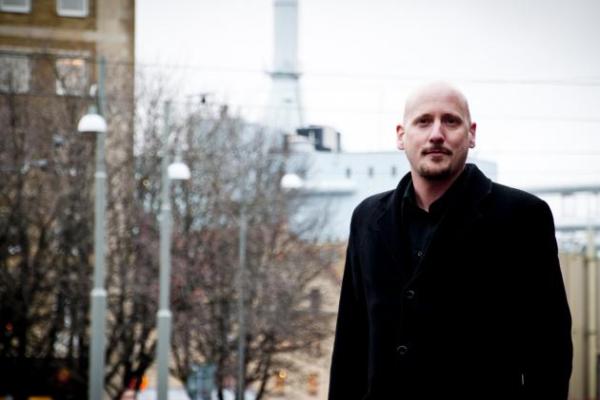Recently Red Youth attended a political summer camp with Swedish comrades from the Kommunistiska Partiet and the youth organisation Revolutionär Kommunistisk Ungdom.
Our Swedish comrades were incredibly welcoming and, over the course of a week, many discussions took place about the respective political situations in Sweden and Britain, on wider global issues, and tactics and strategies for building a revolutionary Marxist-Leninist party.

The summer camp features a healthy mix of political presentations & discussion, sport, music, and relaxation, all taking place in a supremely comradely environment with party members, youth, and supporters from all over Sweden.
Red Youth took the opportunity to interview Robert Mathiasson, Chair of the Communist Party of Sweden, about the EU and Brexit.

People hold up Sweden and other Nordic countries as examples of successful “moderate socialism” with a good balance between taxes and social services, how does your party view that?
In Sweden we have historically had a strong working-class movement. We were not in any of the world wars, we have great natural resources, and this helped Sweden become a decent country for our working class. The capitalists wanted to join the European Union, and when socialism broke down and there was no threat any more from a different system, in the same month even when the Soviet Union was breaking up, the Social Democrats changed their opinion. They wanted to join the European Union, and they abandoned the last part of their reformist project, the so-called Löntagerfonder [funds for the workers to step-by-step take ownership of their workplaces], which was never intended to be implemented anyway. All this happened in the same month, December 1991. So it’s quite clear, the monopoly capitalists wanted to join the European Union to fight in the world, but especially to fight against the workers, and to take back all they had been forced to concede during the 20th century.
So the social democratic movement was more orientated towards the workers while the Soviet Union still existed, and wavered to the capitalist side after the collapse?
Yes, they have always been class-collaborators, especially since 1917 when the party split. But with the threat from the Soviet Union and with a strong workers’ movement they had to accept that. The social democrats are pragmatic, that was the situation then, and they worked with what they had. The main thing for the capitalist is always the main thing for the social democrats, that’s how they make class-collaboration work.
Is Sweden an imperialist country?
Of course. We used to say that we are the vulture of the imperialist world, but now we are more like a hawk for imperialism. We are among the most aggressive countries when it comes to the US dictated struggle against Russia and so on. It’s not so strange, the Swedish upper class is just like the upper class in Poland and Romania, allying with the biggest imperialist country and being very subservient. Back in the 30s and 40s the biggest imperialist power was Germany and everyone spoke German, in 1945 it was a total flip and everyone started to learn English.
What effect has the world economic crisis had on Sweden?
Quite a big effect, but still class struggle takes time, especially in a country like Sweden where class-collaboration goes both ways. We do not have a violent history such as in the US or France, so it takes time. But the crisis has accelerated the class struggle from the upper class, and since many of the security nets that were built up in the last century still exist, even though they have picked holes in them everywhere, workers in Sweden have not felt the crisis like in Greece, or Spain, but still the differences amongst workers are widening and widening. You have a big group that are hurt by the crisis, and that’s a strategic problem for us, the division in the working class.
How was the British EU referendum portrayed in the media in Sweden?
Disastrous, disastrous! Sweden is a small country but we have a really strong monopoly capitalist class here. We are like Saudi Arabia or some small state in the gulf when it comes to a small group owning everything. Worse than the US, worse than Great Britain, and our monopoly capitalists are really united, there is no split among the upper class like in Germany. TTIP, is that really good for the German monopoly capitalist? They are not 100% sure. And in Britain, is EU the best thing for the British monopoly capitalist? Should they let Germany take the lead in Europe? But we do not have that split, so they have a really tight grip and their view of what’s happening is totally dominant.
The media wrote that we can never travel to Great Britain, it’s impossible for young people to keep working in London. “How can they leave Europe? That’s geography, not politics,” they said. And the picture now is that 52% of people in Britain are narrow-minded, stupid, racist people. That was the picture that even left-wing people, maybe even especially left-wing people painted.
The head of the biggest monopoly capitalist family in Sweden, Jacob Wallenberg, said the day after Brexit, “this is the saddest day in my professional life,” so for me it was the best day!
What were the views of the Swedish working class on the EU referendum and on the EU in general?
There is a major distrust when it comes to the EU, when it comes to Brussels, and only about 1/3 of the working class is positive about the EU after 20 years of membership, 2/3 are not positive. But the resistance, the will to leave the EU is not that strong because the political parties have abandoned it. If you are against EU then you come into conflict with the monopoly capitalists.
The Green Party have dropped their Swexit policy, the left-wing party has not officially dropped their Swexit policy but they’ve very much toned it down and in practice have dropped it. Even the right-wing neofascist party are toning it down, and they will leave the issue as long as the monopoly capitalists are united in their view that the EU is the way to go. So I say there is great potential in this question here in Sweden because the distrust is enormous and the elite is totally for it, but there is a lot of work to do to make this distrust into a resistance. It’s a big step from not being positive on the EU to wanting to leave the EU.
Have there been any other groups apart from the Communist Party advocating for Swexit?
Not really, no, as I said the Green Party, and the left-wing party have abandoned it, and the Trotskyist parties, they are really small and they want a socialist EU. We have a peoples’ movement, Nej Till EU that was formed in the early 1990s, which has become smaller since then but is still very important. The thing with the Swedish resistance to the EU, it has always been from an anti-capitalist stance, a left-wing stance, different from in Great Britain. But since the left-wing party have left it, the neofascist party Sweden Democrats have almost taken over the question, especially since the media and the left-wing liberals want to portray it like that, but I think they will be taken into the fold with the other right-wing parties and they will have to abandon it. I think we are quite alone and on the one hand that’s not good when it comes to forming the discussion in society, on the other hand I think that’s a strategic question for us. It makes it possible for us to go out to the workers with a question that lies there, even if they don’t speak it all the time, in their hearts and in their minds they don’t want Brussels.
Has the result of the British referendum sparked more dialogue and debate about leaving the EU?
Yes, for us that is the best thing about it, because 5 years ago, and definitely 10 years ago, all the discussion was “what new country will come into the union? This is a harmonic, growing European Union.” Now the discussion is discussion is “what country will leave the European Union? Will France, will Greece, will Spain, will Sweden?” It changes the discussion in a very good way, so thank you, British people!
What is your analysis for the reason of the leave vote in Britain? Was it because of the right-wing parties promoting xenophobia and racism?
I think it’s quite clear that it is a class struggle, but in this world we live in, with neoliberalism, with the European Union and so on, the class struggle isn’t so clear and open as it was in the 20th century, between 1917-91. It’s the struggle between the countryside and big cities. That’s what the EU wants, growing cities and the countryside left behind, that’s something even Marx and Engels wrote about, but it’s not a question about cities vs farmers, it’s a class struggle. And of course the migration crisis is a part of this class struggle too.
The problem is the left-wing parties have abandoned making politics out of this, they are going to defend of all this instead of making class politics out of this, leaving it to right-wing parties to, very skilfully, make their politics out of it. I don’t think it’s that interesting how UKIP makes politics out of it, what they say, how they do it. The question is how should we make politics out of it, and that’s a discussion that here in Sweden the left-wing parties, outside our party, are not interested in having. And as long as they don’t do it, the right wing parties will grow and the guilty ones are the left wing itself.
What do you think will be possible for your party as a result of Brexit, will it effect how you’re dealing with the question of Europe?
I think it’s very important, if the British people had voted to stay in the EU they would have done everything to bury the question of any country leaving the EU. But now the question is on the table, so that makes a huge difference. It’s not a question that has ever been debated in our party, we do not have any members or organisations that say “maybe we shouldn’t demand that Sweden leave the EU,” it’s 100% unity when it comes to this question. Sometimes it’s a question that you really focus on, and sometimes not, but now we will focus on it as one of our main questions.

